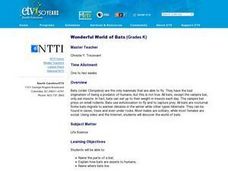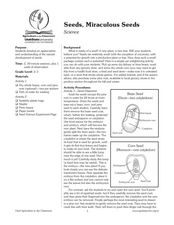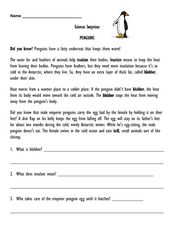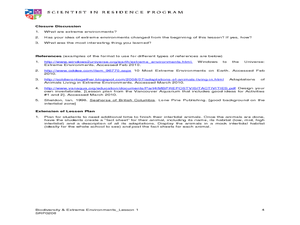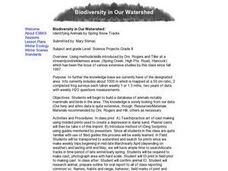Curated OER
Wonderful World of Bats
Students create a book about bats. They write a letter to a scientist containing questions about bats. They compare the socialization of bats to humans; compare the needs of bats to humans and other animals.
Curated OER
Seeds, Miraculous Seed
Students investigate relationships between plants and animals and how living things change during their lives. In this life cycle lesson, students split different types of seeds apart to see the beginning life stages of future plants.
Curated OER
Rocky Intertidal Field Trip
Students investigate tides and the land submerged under them. In this intertidal field trip, Students visit the intertidal zone and observe the habitats and animals that live there. Students view the pools under rocks where lobsters...
Curated OER
How Animals Prepare for Winter
Second graders study which animal hibernate and which migrate. They observe the weather conditions related to each and complete the associated worksheets and web activity.
Curated OER
A Long Winter's Nap
Students explore the process of estivation, hibernation and torpor and the ways that frogs adapt to seasonal weather changes.
Curated OER
The Science Behind Dolphins
Students discover facts about marine mammals, specifically dolphins. In this K-2 lesson plan, students identify the different species of Cetaceans, focusing on dolphins. Students answer true/false questions regarding cetaceans and...
Curated OER
Science Surprises: Penguins
In this reading comprehension learning exercise, students read a 3 paragraph selection about penguins and then respond to 3 short answer questions.
Curated OER
Animal Science - Body Temperature
Students use the TI-83 + linked to the CBL2 and temperature probes to perform an experiment. Each of the temperature probes is placed into a different cup, one insulated and one not insulated. Each cup holds warm water. The two cups are...
Curated OER
Hawaii's Migratory Animals
Students act as travel agents to plan a trip for a migratory animal. They conduct research and design a travel brochure that includes a migratory route, illustrations of planned stopovers and special tourist attractions the animal might...
Curated OER
Extreme Environments
Students examine extreme environments and the characteristics that make them. In this adaptation lesson students see how animals have adapted to these environments.
Curated OER
Biodiversity in Our Watershed
Eighth graders create a database of animals and birds in the area in which they live. They use molded prints to make a cast of an imprint from a specific animal. They identify and research animals and prepare an outline for an oral...
Curated OER
The Story that Tracks Tell
Eighth graders observe and investigate animal tracks. They draw prints for local animals and switch with another student to guess the animal, identify animal tracks in a nearby wood lot, create plaster casts of the tracks, and write a...
Curated OER
Types of Behavior
In this science worksheet, students analyze specific animal and human behaviors and classify them as innate or learned. Students answer 20 questions, identifying behaviors and explaining how they are helpful to the animal. Note: This...
Curated OER
Keeping Warm When it is Cold: How does a polar bear keep warm?
Students make a model of a polar bear and discuss why fur/skin color is important. They also perform a simple experiment using black and white socks to determine how color affects temperature.
Curated OER
Global Greenup
Students utilize satellite images to track the life cycle of vegetational growth over a large area. Animal migratory patterns are compared to this cycle.
Curated OER
Wintry Warmers
In this season worksheet, students read facts about winter and find 20 homophones. Students also correct the errors in the sentences.
Curated OER
A Walk in the Tundra
Discuss the environment of the Arctic tundra using this resource. The focus of this lesson is the story A Walk in the Tundra by Rebecca L. Johnson. The appealing illustrations are bound to captivate your class! After reading the story,...
Curated OER
Playing Hot and Cold
Students read about homeothermy. Through research and poster projects, they gain insight into the diversity among mammals and the ways specific mammals survive in their native climates.
K12 Reader
Fungi Are Alive
They are alive even though they are neither plants or animals! Yes, fungi are the subject of this two-part comprehension worksheet. Kids read the article and then use information found there to respond to comprehension questions.
Curated OER
Tracking in Wisconsin
Students examine how to identify the tracks and track patterns of some common Wisconsin animals. They examine how the footprints of these animals reveal how different feet help different animals navigate the winter snow or survive in...
Curated OER
Snow Lovers or Haters
Students explain the three classifications that define how wildlife species react to winter; and name at least four examples each of chionophobes, chioneuphores, and chionophiles.
Curated OER
Identifying Seasonal Animal Behaviors
Students discuss seasonal behavior of different animals. They participate in group activities and identify animals. They also examine the changes in seasons and how animals act differently in different seasons.
Curated OER
Seasons
Students name the 4 seasons, discussing the weather, plant life, animal life and and activities of each. Students read the book titled, "Hello Arctic," and and discuss changes in seasons that accompany the story. Students complete...
Curated OER
Migration Migraine
Young scholars partipate in a demonstration in which they role play animals migrating between breeding and wintering habitats and encountering hazards at each end of the journey.


